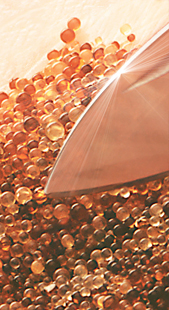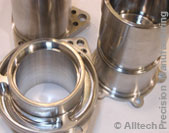
ABA's
Unique DI Resin
Regeneration Process.
ABA Water Systems controls the resin regneraton process to separate cation and anion components, and recharges the resin so that it can be returned to service and used again. The strong acid components are regenerated to dispose of the water’s salts; the strong base components are regenerated to peel away the chlorides and sulfates. Process temperatures, flows, dwell times, chemical mix and other factors are all optimized to fine-tune recovery and produce a consistently high quality dielectric for the user's applications. "Recovered DI resin is a great way to reduce costs for single bed and mixed bed applications," says Tim Weaver, operations manager for the company. "Regenerating spent resins enables customers to save money and better serve their markets at the same time. ”
Spent resin containing any regulated material — even if the volume is only detectable in terms of parts per billion — is classed as industrial waste and is subject to state and federal environmental control regulations. Tossing it into a dumpster and sending it to landfill can cause problems. Big problems, in fact. That same resin, however, is classed as a recoverable resource when it is sent to ABA for regeneration. Also, as a resource for recovery, spent resin can
even be shipped cross-country via common carrier.
Federal and state environmental control agencies regulate disposal of arsenic, barium, cadmium, chrome, copper, molybdenum, zinc and other materials. Companies which illegally dump these materials, with or without other industrial wastes, are risking environmental action.
Critical Environmental Controls.
The sheer volume of industrial by-products and waterborne wastes in recent years has increased tenfold throughout the country’s manufacturing and commercial operations. The costs of DI water resin for manufacturing processes such as electrical discharge machining, waterjet cutting, vibratory finishing, and more keep climbing. So have the costs and liabilities associated with disposing of the resulting industrial wastes. Regenerating the resin is a practical solution to controlling costs and avoiding regulatory problems.
“Regulatory agencies want to help manufacturers, and will readily answer questions about
how best to dispose of industrial pollutants and avoid liability,” Tim Weaver says. “It’s always
advisable to talk to the experts to be sure of what action to take.”
Tim adds that the most important question a POU supplier and its industrial customer should
ask of anyone providing regeneration services is this: “Are you licensed to dispose of industrial
wastes?” ABA reports that it keeps copies of its license available for e-mailing or faxing to customers
so that they always have a reference when questioned about meeting environmental
control regulations. |

